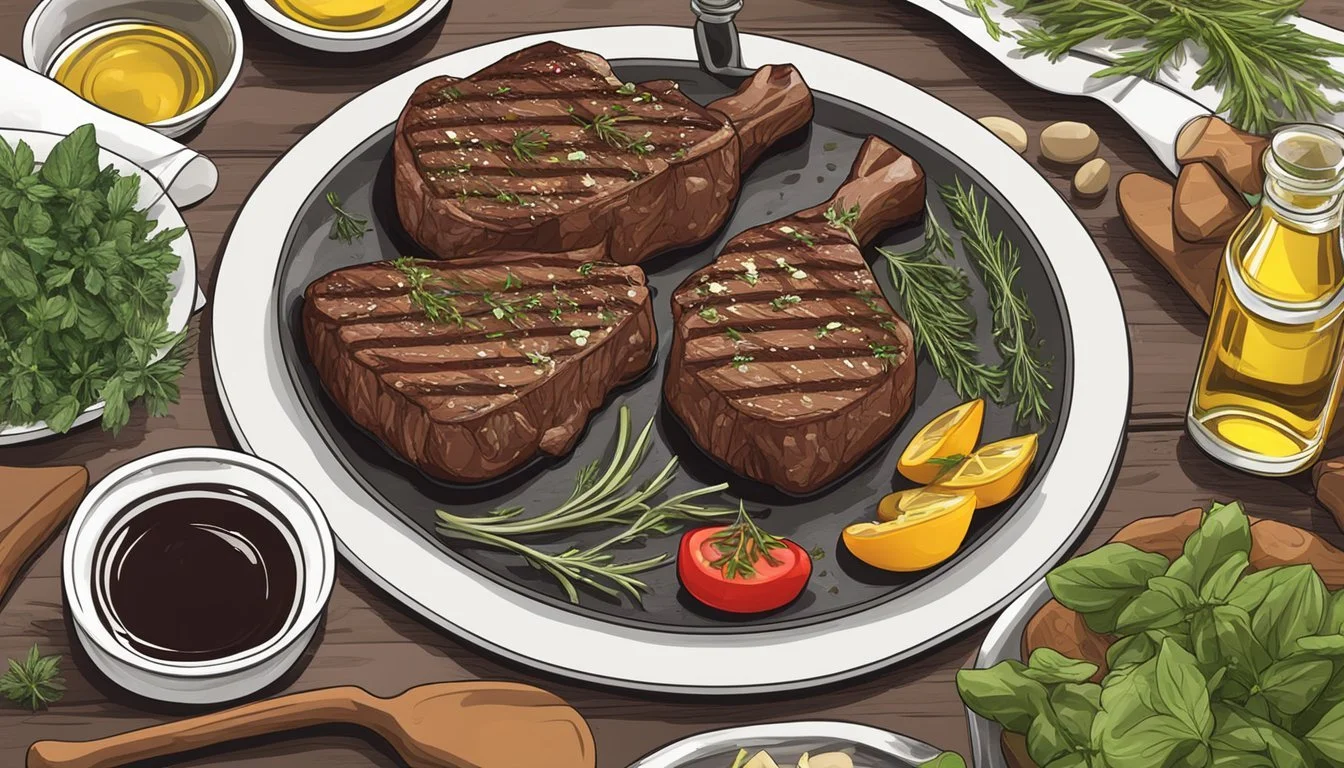Can You Have Olive Oil on Carnivore Diet
Exploring Fats in Meat-Based Eating
The carnivore diet has been positioning itself in the nutritional realm as a regimen focused exclusively on animal products. Proponents of this dietary approach argue for the consumption of meat, fish, eggs, and animal-derived fats while eliminating plant-based foods entirely. The diet's philosophy is grounded in the belief that human digestion is optimized for animal products, and that many plant foods may be unnecessary or even harmful. As such, the carnivore diet is often viewed as a response to the evolutionary eating patterns of ancient humans.
Within this framework, the inclusion of olive oil presents a nuanced challenge. Olive oil is a plant-derived fat, lauded for its heart-healthy monounsaturated fats and its role in the Mediterranean diet, one of the most researched and recommended diets for long-term health. However, olive oil's status as a product of plant origin appears at odds with the strict emphasis on animal-based nutrition in the carnivore diet. This tension raises questions about the place of olive oil in a diet that otherwise eschews plant foods.
While olive oil has undeniable health benefits and has been shown to support various aspects of wellness, strict adherents to the carnivore diet might exclude it due to its plant-based nature. Despite this, some individuals on the carnivore diet may choose to incorporate olive oil, indicating a more relaxed interpretation that prioritizes the inclusion of certain healthful fats regardless of their origin. This flexibility suggests that the carnivore diet's framework can be adapted to personal preferences and nutritional beliefs, making room for individual interpretation.
Understanding the Carnivore Diet
The carnivore diet is characterized by its exclusive focus on animal-based foods while foregoing plant-derived options. This dietary approach invites a fuller appreciation of humans’ ancestral eating patterns and seeks to leverage the purported benefits tied to meat-centric consumption.
Origins and Evolution
The carnivore diet's roots can be traced to the belief that early human ancestors primarily consumed animal products. Proponents suggest that early diets were heavy in meat, fish, and different forms of animal fats, reflecting the food sources that were available during pre-agricultural times. The modern variation has evolved with the aim of emulating these patterns, positing that such a diet aligns closely with human physiology and can lead to various health benefits.
Core Principles of Carnivory
At its core, the carnivore diet is straightforward:
Animal Products: A strict carnivore diet consists exclusively of meat (including beef, pork, lamb, poultry), fish, eggs, and possibly dairy for those who can tolerate it.
Exclusions: All plant-based foods are generally eliminated, including fruits, vegetables, legumes, grains, nuts, seeds, and any oils or fats derived from plants.
The diet's philosophy hinges on the idea that a meat-only regimen can induce a state of ketosis, where the body burns fat for fuel in the absence of carbohydrates.
Typical Foods and Exclusions
Foods Included:
All types of meat (beef, pork, poultry, game)
Fish and seafood
Eggs
Animal fats like tallow and lard
Dairy products (specifically butter and hard cheeses for some)
Foods Excluded:
Fruits and vegetables
Grains and legumes
Nuts and seeds
All oils from plant sources
Any food that does not originate from an animal
The diet's strict adherence to animal-sourced foods positions it as a counter to diets rich in plant-based nutrition, advocating for a return to what some perceive as a more natural, ancestral way of eating.
Make your life easier by ordering tallow or lard online; it's just a few clicks away!
Health Implications of the Carnivore Diet
The carnivore diet, emphasizing the exclusive consumption of animal products, has been associated with various health implications. This section explores the potential benefits, risks, and the overall nutrient profile analysis of the diet.
Potential Benefits
A carnivore diet is rich in protein and certain nutrients, which are essential for maintaining muscle mass and overall bodily functions. Some individuals report improved energy levels and a reduction in inflammation when adopting this diet. This could theoretically lead to benefits such as:
Weight Loss: High protein content can increase satiety, potentially leading to a caloric deficit and weight loss.
Improved Mental Clarity: Some anecdotal reports suggest that a carnivore diet may contribute to increased focus and mental clarity.
Risks and Considerations
However, healthcare professionals express concerns about the long-term health risks associated with a carnivore diet, including:
Cardiovascular Disease: A diet high in cholesterol and saturated fats might increase the risk of cardiovascular disease.
Nutrient Deficiencies: Excluding plant-based food sources can lead to deficiencies in certain vitamins such as vitamin C and fiber.
Bone Health: Low intake of foods that contribute to alkalinity may promote calcium loss, potentially affecting bone health.
Nutrient Profile Analysis
The nutrient profile of a carnivore diet is significantly different from more varied diets. It typically includes high levels of:
Protein
Found in: Meat, fish, eggs
Importance: Muscle repair, enzyme functions
B Vitamins
Found in: Organ meats
Importance: Energy production, brain health
Iron
Found in: Red meat
Importance: Oxygen transport in blood
Zinc
Found in: Shellfish, beef
Importance: Immune function, DNA synthesis
Conversely, the diet is typically low in:
Carbohydrates: The diet eliminates grains, fruits, and vegetables which are primary sources of carbohydrates.
Fiber: Essential for digestive health.
Some essential vitamins and minerals found primarily in plants.
In summary, while individuals may experience changes in weight loss, energy, and inflammation, the carnivore diet introduces significant risks and nutritional considerations. It is crucial to consult with a healthcare professional before starting this diet, especially for those with pre-existing conditions like diabetes or cardiovascular disease.
Fats in the Carnivore Diet
In the carnivore diet, fats serve as a primary energy source. They are essential for many physiological functions and play a crucial role in the nutritional profile of this dietary approach. This section will discuss the role of fats within the diet, how to source high-quality animal fats, compare different animal fats, and address the inclusion of plant-based fats such as olive oil.
Role of Fats
Fats, particularly animal fats, are foundational in the carnivore diet, providing energy, aiding in the absorption of fat-soluble vitamins, and contributing to satiety. They consist of a mix of saturated and unsaturated fats, with saturated fat being more prevalent in animal-based foods. These healthy fats also serve as building blocks for hormones and cellular structures.
Sourcing High-Quality Animal Fats
When following a carnivore diet, the focus is on consuming high-quality animal fats. Tallow and lard are preferred choices as they come directly from animals and align with the diet's philosophy. Butter and ghee are also incorporated, especially from grass-fed sources due to their nutrient density. Sourcing fats from well-raised animals ensures a better nutritional profile.
Avoid the crowds and shop for ghee online from the comfort of your home!
Comparison of Animal Fats
Different animal fats offer varying benefits:
Tallow: High in saturated fat, derived from beef or mutton, and suitable for high-heat cooking.
Lard: Obtainable from pork, rich in monounsaturated fats, and has a neutral flavor.
Butter: Contains butyrate, a short-chain fatty acid beneficial for gut health and has moderate heat stability.
Ghee: Clarified butter that is lactose-free and has a high smoke point, making it ideal for cooking.
The Debate Around Plant-Based Fats
The carnivore diet primarily discourages the consumption of plant-based oils. However, there is a debate regarding the inclusion of olive oil because it is rich in monounsaturated fats, which are considered healthy fats. Olive oil is an exception as some followers include it if they don't react negatively to plant foods, though it's not a staple like animal-derived fats. Plant-based oils are generally avoided to maintain the diet's integrity.
Incorporating Oils Into a Carnivore Diet
In a diet centered around animal products, the role of cooking oils is a topic of debate. This section examines the usage of olive oil and other oils within the context of a carnivore diet, evaluating the suitability, benefits, and drawbacks.
Can You Have Olive Oil on a Carnivore Diet?
The carnivore diet primarily consists of animal products, which generally excludes plant-derived ingredients such as olive oil. However, some individuals following the diet may choose to include olive oil for cooking or flavoring purposes. The inclusion of olive oil is not universally accepted and can vary based on personal preference and dietary tolerance.
Pros and Cons of Adding Oils
When considering adding oils to a carnivore diet, one should weigh the following:
Pros:
Olive oil is lauded for its monounsaturated fats and is often regarded as a heart-healthy option.
Cons:
The carnivore diet's philosophy emphasizes the consumption of animal products, and olive oil, as a plant-based product, does not align strictly with this principle.
Some argue that plant oils may contribute to inflammation, which the carnivore diet seeks to minimize.
Alternatives to Olive Oil
For those strictly adhering to the carnivore diet, alternative fat sources are preferred:
Tallow and lard are rendered animal fats that are consistent with the diet's ethos.
Butter and ghee, derived from dairy, offer options for those who include dairy in their carnivore diet.
In summary, individuals following the carnivore diet who wish to use oils have options that align with the diet's focus on animal-derived products. Olive oil, while not adhering strictly to carnivore principles, may be incorporated by those who choose to expand their diet to include select plant-derived foods.
Meal Preparation and Cooking Techniques
In the context of a carnivore diet, the focus of meal preparation and cooking revolves around meat, fish, and eggs. Adopting the right techniques can enhance the natural flavors and nutritional value of these animal products.
Best Practices for Cooking Meat and Fish
For both meat and fish, the goal is to achieve perfect doneness while retaining moisture and flavor. Here are key tips:
Temperature Control: Cook meats using a meat thermometer to reach the ideal internal temperature for safety and preference. Rare to medium-rare is often recommended for beef, aiming for an internal temperature range between 120°F and 135°F (49°C to 57°C).
Cooking Methods: Grilling and broiling allow for a flavorful char and searing that locks in juices, while slow-cooking and braising tenderize tougher cuts of meat over time.
Resting After Cooking: Allow meat to rest for a few minutes after cooking. This helps redistribute the juices and results in a more tender and flavorful experience.
Fish demands a gentler approach:
Avoid Overcooking: Fish cooks quickly and can dry out if overdone. Aim for an internal temperature of 145°F (63°C).
Skin-on Technique: Cooking fish with the skin on helps to keep it intact and prevents sticking to the pan. The skin can be removed easily after cooking if desired.
Flavor Enhancement Without Non-Carnivore Ingredients
One key challenge on a carnivore diet is flavoring meals without plant-based ingredients. Here are techniques to enhance flavor using carnivore diet-compliant ingredients:
Use Salt Generously: Salt is essential for both seasoning and bringing out the natural flavors of the meat. It can also aid in creating a delicious crust on steaks when seared.
Incorporate Fats: Cooking oils like butter and animal fats add richness and carry flavors. They are crucial for cooking at high heat and preventing lean meats from drying out.
Spices and Seasonings: While many spices are plant-based and not strictly carnivore, some individuals include them in small amounts. If strictly following the diet, consider using animal-based seasonings like bone marrow or homemade stocks.
Basting with Butter: During cooking, especially when pan-searing, baste meats with butter to inject additional flavor and maintain moisture.
Daily Eating Patterns on the Carnivore Diet
Adhering to the carnivore diet requires a focused approach to meal planning and eating schedules that ensure adequate nutrition and satiety through exclusively animal-based foods.
Designing Your Meal Plan
When someone constructs a meal plan on the carnivore diet, it revolves around meat, fish, eggs, and organ meats, because these are the primary sources of nutrition. It's essential to include a variety of these animal-based foods to maintain a balanced intake of fats and proteins. For example, a typical day might include:
Breakfast: Eggs and bacon
Lunch: Ribeye steak with a side of liver
Dinner: Salmon with a portion of bone marrow
Some individuals may choose to incorporate cheese as well, although it is often consumed in moderation due to its higher carbohydrate content compared to other animal products.
Timing and Frequency of Eating
Those following the carnivore diet often find that the high protein intake and fats from animal products provide a longer-lasting sense of fullness, which can lead to less frequent meals. It is not unusual for people on this diet to practice some version of intermittent fasting, eating within a set window of time each day. The timing typically looks like this:
First meal at noon (often post workout)
Last meal around 8 PM
This eating pattern limits consumption to an 8-hour window, providing 16 hours of fasting which may enhance fat loss and muscle gains.
Snacking Options
The concept of snacking is less common on the carnivore diet due to the satiating nature of the meals. However, for those needing a snack, options are usually high in fat and protein to stay in line with dietary principles. Acceptable snacks might include:
A small handful of pork rinds
Slices of cheese
Leftover meat or fish from previous meals
Snacks are typically planned in advance to avoid the temptation of off-diet choices and are consumed in moderation to maintain focus on larger, nutrient-dense meals.
Adapting to the Carnivore Diet
When adopting the carnivore diet, individuals should plan for the transition, develop strategies for long-term adherence, and be attentive to their body's reactions to dietary changes.
Transitioning From a Varied Diet
The shift from a diet including various food groups to one solely consisting of animal products can be significant. Initially, a person may experience symptoms of adaptation such as headaches or changes in energy levels, which often coincide with the body entering a state of ketosis. During this time, it's essential to maintain adequate hydration and consider including electrolytes to alleviate these symptoms.
Weight Loss: Some may notice weight loss due to reduced carbohydrate intake.
Exercise: An individual might need to adjust exercise routines as the body adapts.
Long-Term Adherence Strategies
Sustaining a carnivore diet can require thoughtful planning to ensure nutritional adequacy and to manage cholesterol levels, particularly for those who may have pre-existing health concerns. Strategies include:
Regularly incorporating a variety of animal products to maintain a broad spectrum of nutrients
Choosing high-quality, grass-fed meats for a favorable omega-3 to omega-6 fatty acid profile
Individuals should occasionally assess their diet's impact on their health with medical professionals and consider periodic laboratory tests to monitor their cholesterol and other health markers.
Listening to Your Body
The body's feedback is crucial for adapting to the carnivore diet. One should pay close attention to:
Protein intake: Ensuring not to overconsume as it may lead to digestive discomfort
Energy signals: Adjusting fat intake to manage energy levels, as fat acts as the primary fuel source in the absence of carbohydrates
Individuals may also notice changes in their appetite and should adapt their eating frequency and portion sizes accordingly. Listening to one's body is vital for adjusting the diet to ensure it aligns with personal health goals and well-being.
Frequently Asked Questions
In this section, readers will find clear answers to common questions surrounding the inclusion of olive oil in a carnivore diet, dispelling prevalent myths, and providing insights from experts in the field.
Addressing Common Concerns
Can one include olive oil in a carnivore diet? The carnivore diet primarily consists of animal products, focusing on high fat and high protein intake from meat sources. Olive oil, being a plant-derived fat, is not a traditional component of a strict carnivore diet. However, some individuals may choose to incorporate it due to its content of healthy fats.
Are there nutritional benefits to using olive oil for those following a carnivore diet? Olive oil is rich in monounsaturated fats, known for their potential to support heart health. While it's not aligned with a strict carnivore approach, which eschews plant-based foods, adding olive oil might be considered for its nutrients by those who adopt a more relaxed version of the diet.
Myths and Misconceptions
Is it true that all fats can be equally consumed on a carnivore diet? It is a common misconception. A carnivore diet emphasizes fats from animal sources, like butter, ghee, and the fat inherent in grass-fed meats. People often mistake the diet's high fat content to mean that all forms of fat, including those from plant sources like olive oil, are permissible.
Do you need to supplement your diet with plant-based oils on a carnivore diet? Not necessarily. Those strictly adhering to the carnivore diet aim for nutrient intake, especially fat, to come directly from animal products. This diet operates on the principle that all necessary nutrition can be obtained from high-quality, whole-animal sources, assuming meat quality is high and includes a variety of organs and connective tissues.
Expert Insights
What do healthcare professionals say about using olive oil on a carnivore diet? Healthcare professionals might highlight that including olive oil deviates from the strict carnivore protocol. Those seeking to include olive oil should consider its impact on the diet's intent and consult with a healthcare professional to ensure their overall nutritional needs are met.
How can the integration of olive oil into a carnivore diet be optimized? For individuals choosing to include olive oil, moderation is key. It should complement, not replace, the intake of animal fats crucial to the diet's premise. Experts might advise focusing on a high protein intake from animal products, while using olive oil sparingly, if at all.










